Pretty Scars Read online
Pretty Scars
CD Reiss
Contents
I. Carrie
II. Gabriel
Acknowledgments
Also In Kindle Unlimited
Copyright © 2019 by CD Reiss
All rights reserved.
No part of this book may be reproduced in any form or by any electronic or mechanical means, including information storage and retrieval systems, without written permission from the author, except for the use of brief quotations in a book review.
Part I
Carrie
Chapter 1
LOS ANGELES - 1995
My palm was sweating.
The Dorothy Chandler Pavilion was full but not hot. I wasn’t getting sick. But there I was, in a sleeveless gown, sweating like a schoolgirl with my damp hand holding Peter’s on the armrest.
Adam Brate had just drawn his bow across the strings for the final moan of the first movement of the famous concerto we’d all come to hear. Ballad of Blades. I knew the piece, and I knew what was next. But he paused. Lit from behind, face obscured by a shadow perfected over years of staging, he was now and always would be the anonymous genius. His body in silhouette, paired with the instrument between his legs, he dominated the concert hall like a giant. The music had molded the space into its own form then died.
Someone coughed.
And still, Adam Brate sat in the shadows, legs spread, bow poised. This was his piece. A piece I loved, memorized, played loudly when no one was around. It had made him famous, and yet, he stayed anonymous.
My hand got damper with every second that passed. I pulled it off the armrest and put it in my lap. Peter, never one to take a hint, moved his hand to join mine. He squeezed twice to get my attention, then shifted my diamond ring back and forth twice, as if it was some kind of lever.
I didn’t look at my husband. I couldn’t. My body belonged to the man on stage. I was in the third row, but I was sure his attention found every last person in the auditorium.
Adam Brate shifted his shoulders forward as if starting the next movement. The orchestra behind him laid the first notes, but Brate snapped his bow vertical. The conductor stopped moving, and twenty-two hundred people held their breath. We knew what came next. My mind played the first measures for him.
“What the hell is he doing?” Peter whispered.
Answering would be a waste of time. If Peter couldn’t see that the musician was about to turn this entire thing upside down, no explanation would help him.
Adam Brate drew his bow down to the strings and played a single note.
Then another.
And it wasn’t A Ballad of Blades. Or any orchestral composition. He played a Dolly Parton song that I remembered in the voice of Whitney Houston.
“I Will Always Love You.”
That was when my sweat turned to tears.
Chapter 2
UNIVERSITY OF SOUTHERN CALIFORNIA - 1993
A car screeched behind us right before a man’s voice called, “Hey! Miss! Red Hair! Beautiful!”
I turned around when he called me beautiful because that was when I figured out I was Miss and Red Hair, not because that was what I answered to. Andrea turned with me.
“Hello again, Mr. Stravinsky,” she purred.
The man chasing us down was around our age, maybe twenty or twenty-one, in worn jeans and boots. USC hoodie. One hand clutched a violin with the bow pressed against the neck, the other held the case. A heavy bag slung over his shoulder bounced on his hip as he ran toward us. We’d seen him in the parking lot across Jefferson, busking outside the University Village food court. He looked as if he’d grabbed his stuff in a hurry.
“We’re going to be late,” I said, even though I had no intention of moving until I found out what he wanted. Professor Richards had his TA lock the doors one minute after the start of class, and I didn’t want Andrea to miss Cognitive because of me.
“We have a minute,” she said.
When he got to us, he was so out of breath he bent over, gasping.
“Are you all right?” I asked.
“You… you left this… in the…” He held out the hand with the case. A hundred-dollar bill was folded between two fingers. “The wrong bill.” He put down the case and held out the hundred.
When I’d given him the money, I didn’t notice him. The music shut out everything else. Without it, I could see him. His eyes were warm mahogany, and the waves of his dark, unkempt, shoulder-length hair were tinged with the sun.
“No,” I said. “It’s the right one.”
His face twitched for a moment, as if he had to hide surprise, then he smiled. One of his front teeth had a tiny triangle of a chip and the hairline scar on his square chin got a little lighter. Imperfections, sure, but they only made him look more perfect.
“It’s too much,” he said. The wind changed direction, blowing his hair into his face. He shifted his head enough to move it to the side, exposing the lines of his tanned neck and the sharp shadows under his jaw.
Funny how I didn’t notice how handsome he was while he was playing.
“I’ve never heard anyone play like that,” I said.
“Like what?” His hand dropped a few inches.
Out of the corner of my eye, I saw Andrea look at her watch. There wasn’t enough time to describe his music.
“Like they were about to levitate.”
He laughed, and it was almost as melodic as what he drew from his violin. “Really”—he held out the money again—“it’s my pleasure. A dollar would have been enough.”
“Keep it,” I said.
Andrea cleared her throat.
I shifted my bag on my shoulder and turned away. “I have to get to class.”
“I’m going to throw it away if you don’t take it.”
“Like hell.” Andrea snapped it from him. “I’ll stick it in her bag when she’s not looking.”
“Thank you.” He picked up his violin case.
“If you busk again, I’m putting another hundred and I’m going to run away so fast you won’t catch me.”
“I’ll catch you, don’t you worry about that.”
“What if I don’t want to be chased?”
Andrea pulled me by the elbow. “Great. Thanks. Come on.”
“Bye,” I said, turning with her.
“What’s your name?” he called after me.
“Bye,” I shouted over my shoulder.
“I’m Gabriel!”
Maybe it was the fact that he didn’t press me, but offered a piece of himself that erased my reserve. Turning one last time, I saw he wasn’t chasing me as if he was entitled to my time. He stood there with his hair flicking in the spring breeze, and I wanted to tell him my name, but I was cautious.
“Bye, Gabriel!”
I had to get to class. I had to finish school. I wasn’t in the mood for a sexy musician who could levitate when he played.
“Bye!” He waved and picked up his violin case, but he didn’t run after me.
I liked that so much I wished I could stay and talk.
My best friend and I ran to class and made it just before the TA locked the door. We dropped into the seats Andrea’s boyfriend, Lenny, had saved for us. He was six-four, skinny and gangly, all elbows, with a long neck and a walnut for an Adam’s apple. They had matching horn-rimmed glasses, and shared not only a goofy sense of humor but a weird fascination with me. I didn’t mind. They didn’t want anything from me but my company. Lenny never looked at me with lust or a need to own me. Andrea didn’t fly into a jealous rage when I was alone with him for five minutes.
To them, I was me. Carrie Drazen. A normal person who, through no fault of her own, suffered from Pretty Girl Syndrome. Men tripped over themselves for my attention. Wom
en assumed I was a man-stealing siren. Teachers assumed I’d gotten far because of my looks, then cut me more slack than I deserved.
I didn’t wear makeup. Didn’t spend too much time on my hair. I dressed for the occasion, but there was no hiding the body underneath. I’d bet on the genetic lottery and won and, like most lottery winners, wound up wondering who I’d be if the numbers had come up different.
Being from a super-rich family didn’t help. I couldn’t complain. Not out loud. But at night, alone, I wondered if anyone with so little suffering in life could ever be a whole person. No one wanted to suffer. My heart broke when we read case studies of traumatized patients. The abused, the refugees, the forgotten. I could sense their suffering. I’d only experienced hurt in the feeling of being valued for what others could take from me. The status of my presence on a guy’s arm. The power of money I hadn’t earned. Sometimes I wondered if there was anything inside me, or if I was no more than a polished shell reflecting what other people wanted for themselves.
Andrea passed me the hundred-dollar bill during the lecture. It was unfolded, and over Benjamin Franklin’s face, written in blue ballpoint, was his name and a number. Gabriel. I collapsed it at the creases and tucked it away.
My friend wrote on the left side of her notebook and pushed it toward me. Are you going to call him?
To her, the answer should be yes. I was single. Gabriel was an appropriate age, good-looking, a wonderful musician, and morally-upstanding enough to return money he believed was mistakenly given. She thought I’d be crazy not to call him.
Actually, I had no idea what she thought I should do. But I knew what I thought, and I wrote it on the edge of my notebook.
No. I’m not.
And that was that.
Cognitive Psych wasn’t the class for distractions. Professor Gannon looked like a slacker with his arms painted in tattoos, but he called on people randomly and mercilessly to make sure we’d read the materials. In the last moments of the class, he was brutal to Andrea, who knew Miller’s Law but stumbled on the actual capacity of working memory.
“A fourth-grader could remember this, Ms. Devonshire. Ms. Drazen?” he called, pointing at me. “Working memory capacity.”
Andrea had already done the hard work, and I was left to fill in the detail. “Seven, plus or minus two.”
“Correct. Reading for the week is on the board. Please come prepared.”
The small auditorium was filled with the sound of rustling books and murmuring students.
“Asshole,” I whispered toward Andrea.
She shrugged.
“Ms. Drazen!” Gannon yelled over the din.
Had he heard me? I sat straight, glanced at the TA for a clue, and got nothing. “Yes?”
“See me after class.” He picked up his folder. “Five minutes.”
He went out the door behind the lectern. We filed out the other side of the room, into the hall.
“Do you think he heard me?” I asked Andrea.
“Maybe.”
Lenny shifted his bag on his shoulder. “Don’t worry about it. PGS.”
“Shut up.”
“He probably wants to raise your grade.” Lenny took Andrea’s books. He was, above all, a gentleman, even when his girlfriend wasn’t having it.
“Or ask you out,” Andrea said.
Over an off-campus lunch, my Linguistics 202 prof had offered me a TA position I was unqualified for. When I refused, he mentioned a restaurant he thought I’d like, and when I turned down dinner, he threatened my grade. He wasn’t a liar. There was no other reason for me to get a C. My parents threatened to take me out of USC, and I was so upset my shame got out of the way long enough for me to blurt out that I would have gotten an A if I’d had sex with the teacher.
I thought they’d be mad at me for leading him on or getting into a position where I had to refuse him. But something else happened. Dad got really quiet. Mom asked to see all the quizzes and tests leading up to the final. They weren’t angry. They went from disappointed parents to avenging angels.
The grade was changed, and by the fall, Linguistics 202 had a new professor.
“Do you want one of us to go with you?” Andrea asked, knowing about the entire episode.
“That would be weird,” I said.
“Better than a D in Cognitive,” Andrea said.
“I’m going to give him the benefit of the doubt.”
“Your trust in human nature is both foolish and inspiring,” Lenny said. “Let me know if he makes a fool out of you. I’ll talk about beating him up before I let cowardice get the better of me.”
“You’re a good friend,” I said. “See you later.”
We said our goodbyes, and I went to Professor Gannon’s office.
Kevin Gannon shared an office with another faculty member. The desks faced opposite walls with a single window between them. He was in his mid-forties. His tattoos sat in silent contrast to the conservatively cut sandy hair that was beating a retreat from his forehead, and the casual sneakers, jeans, and polo shirts belied the rigors of his coursework.
“Ms. Drazen, sit please.” He held out his hand to a chair. “You can close the door.”
The door clicked shut, and I sat with my knees pressed together. He spun his desk chair around to face me.
“So,” he said, rubbing his hands together. The palms were so smooth and soft, they didn’t make a sound. “How are you?”
“Fine, and you?”
“Also fine.”
“I have Lit 405 at three.”
“I don’t want to keep you.” He tented his fingertips, looking down at them for a moment. “But I wanted to deliver some good news.”
“Yes?”
“I recommended you for a Fischer Prize.”
My eyes went so wide with excited surprise, I could feel my lashes. It was an unexpected honor. “Really?”
“And the nomination was accepted.”
His recommendation meant a lot to me, but the fact that it was accepted was huge. I covered my face. I couldn’t believe it. Being recommended was wonderful, but being nominated by a board of people I couldn’t see and who had never met me, just on the basis of my work? I didn’t have words. “Oh, thank you!”
“You earned it,” he said. “They announce winners in May. Fingers crossed.”
“I can’t thank you enough.”
“You can. But there’s one other thing. I don’t want to make inappropriate assumptions.”
Crap. His change of tone was like getting whipped around on the teacup ride.
“Okay?”
“I saw you before class. I was at the light, and you were walking across Jefferson with Ms. Devonshire.”
“We weren’t late.”
“No, you weren’t, but I almost was. I came close to hitting a man who was chasing you. He was carrying a violin.”
That explained the screech of tires behind us.
“I’m sorry, I didn’t mean to make you late.”
“No, no. It’s not…” He leaned against the back of his chair, elbows on the armrest. “I stayed in the car and watched to make sure you were all right.”
Normally I’d find that creepy, but there was nothing but cold common sense in his manner and voice.
“I’m fine.”
“Are you sure?”
“Yes, why?”
“Because you were being chased. It made me uncomfortable.”
Professor Gannon was so straightforward, so clear, so utterly devoid of weird creepiness that I thought I’d stepped into an alternate universe. The ability to experience social comfort made me uncomfortable.
“It’s not a big deal.” I shrugged, looking at the old movie posters on the walls. Casablanca. Now, Voyager. The Birds, with the black splash of a crow caught in a woman’s blond hair.
“You like it?” he asked. “The poster.”
“It’s strange.”
“Have you seen the movie?”
“No, what’s it about?”
“A beautiful, intelligent woman with her own mind stops in a small town. She upsets the balance of nature just by existing.”
“Really? It looks like it’s about crazy birds.”
He smiled, then put his hands on his knees, leaning forward as an intro to changing the subject. “So listen. I understand there’s pressure on women students to stay quiet about harassment. That if you just keep your heads down, maybe it’ll go away. Sometimes it does. But I want you to know that if this guy was bothering you, or if he’s not hearing you say no, that you don’t have to put up with it. You can come to me, or you can go to Student Health.”
“Okay.”
Was he done? Did I have to say something else?
“Good.” He stood with the sigh of an aching back or a bad knee and opened the door. I gathered my things. “Don’t forget to do the reading.”
“I won’t.”
It wasn’t until I was in the hall that I thought of what I had to say. Holding my books to my chest, I looked at him slouching in the doorway, in his neat polo shirt and soft shoes. “Thank you for looking out for me.”
“No problem.”
Andrea was in the hall, holding a slip of paper the size of the ones the staff left in our mailboxes. Her brows knotted when she saw me, and she held up the paper. Gannon had asked to see her as well.
“Don’t ruin it, Carrie,” Gannon said from behind me. When I looked at him, he winked.
She must have been up for a Fischer as well.
“It’s good news,” I whispered to Andrea, giving her the thumbs-up.
I practically skipped to my next class, feeling smart, and good, and worthy. Everything but a reflective shell.
Chapter 3
LOS ANGELES - 1995
You could tell the tourists from the Los Angeles natives pouring out of the auditorium. The visitors wore sweaters and light jackets. The natives dressed for Antarctica.

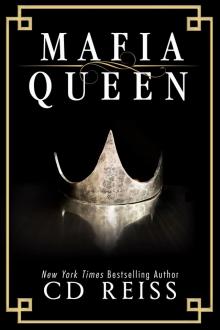 Mafia Queen: The DiLustro Arrangement #3
Mafia Queen: The DiLustro Arrangement #3 Mafia Bride: The DiLustro Arrangement #1
Mafia Bride: The DiLustro Arrangement #1 Mafia King
Mafia King Mafia Bride
Mafia Bride Sacred Sins
Sacred Sins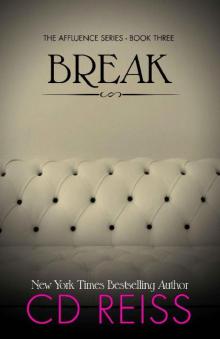 Break
Break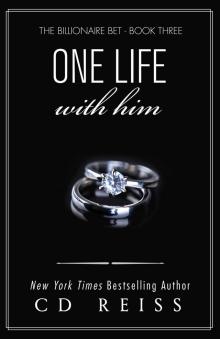 One Life With Him
One Life With Him Pretty Scars
Pretty Scars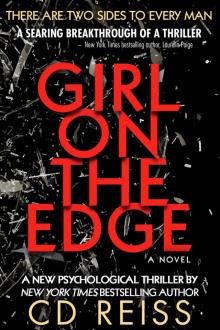 Girl On the Edge
Girl On the Edge Secret Sins: (A Standalone)
Secret Sins: (A Standalone) Cutting Edge_The Edge_Prequel
Cutting Edge_The Edge_Prequel Prince Roman
Prince Roman Hardball: (A Kinky Sexy Dirty Standalone)
Hardball: (A Kinky Sexy Dirty Standalone)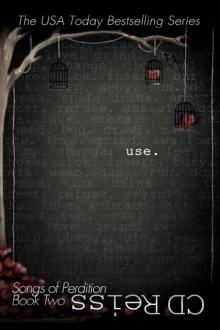 Use
Use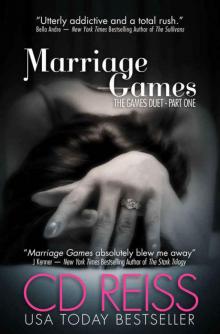 Marriage Games (The Games Duet #1)
Marriage Games (The Games Duet #1)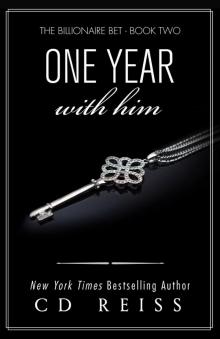 One Year With Him
One Year With Him Sing
Sing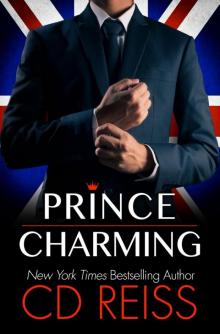 Prince Charming
Prince Charming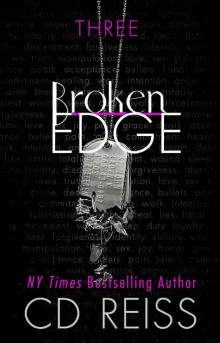 Broken Edge: (The Edge #3)
Broken Edge: (The Edge #3)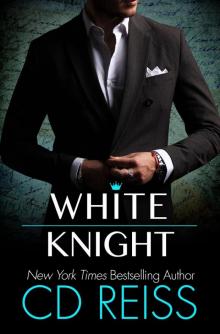 White Knight
White Knight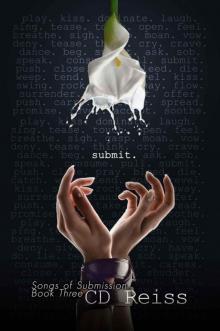 Submit (Songs of Submission)
Submit (Songs of Submission) Jessica and Sharon
Jessica and Sharon Monica
Monica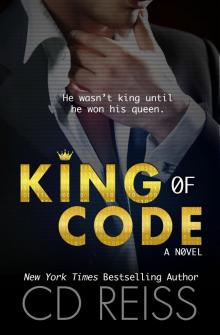 King of Code
King of Code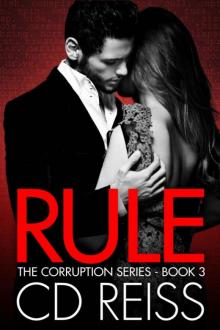 Rule
Rule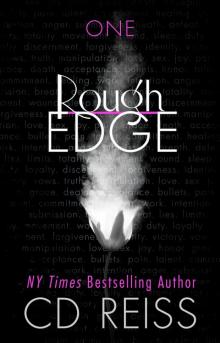 Rough Edge: The Edge - Book One
Rough Edge: The Edge - Book One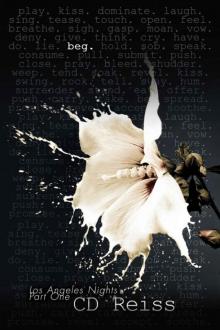 Beg (Los Angeles Nights)
Beg (Los Angeles Nights)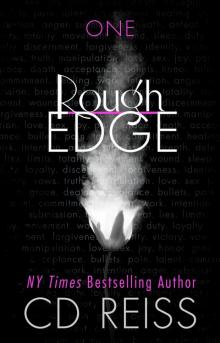 Rough Edge
Rough Edge Separation Games (The Games Duet Book 2)
Separation Games (The Games Duet Book 2)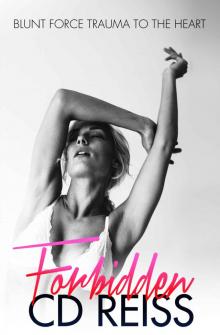 Forbidden: A Standalone
Forbidden: A Standalone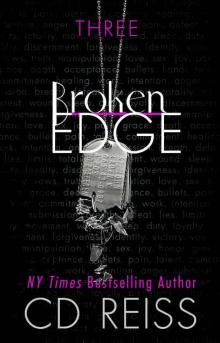 Broken Edge
Broken Edge Hardball
Hardball Coda
Coda Complete Submission: (The Submission Series, Books 1-8)
Complete Submission: (The Submission Series, Books 1-8) Shuttergirl
Shuttergirl